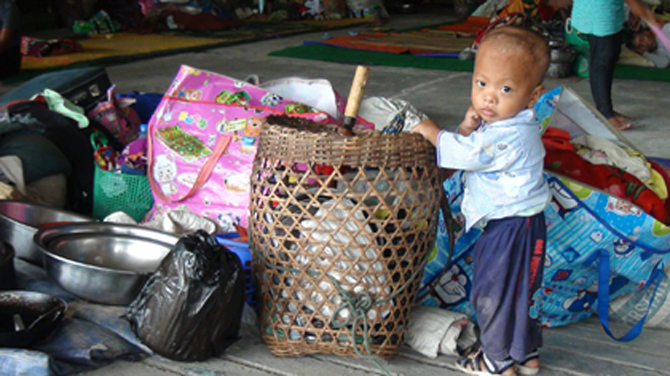Head of HR Commission Rules Out Conflict-zone Inquiry

BANGKOK — The chairman of Burma's National Human Rights Commission said on Tuesday that it was premature for the newly established body to investigate allegations of human rights abuses in ethnic minority areas.
“The national reconciliation process is political,” said Win Mra, the chairman of the NHRC, speaking at a press conference at Thailand's Ministry of Foreign Affairs on Tuesday afternoon. He added that “to investigate into conflict areas would not be appropriate at this time.”
The NHRC recently visited war-torn Kachin State in Burma's north and urged both the government and the Kachin Independence Organization (KIO) “to engage in a dialogue process.”
Fighting has raged in Kachin State since June 2011, driving around 50,000 people from their homes.
The London-based NGO Christian Solidarity Worldwide, which visited the conflict zone recently, reported that “accounts of torture and other abuses are a cause for very grave concern, and the humanitarian challenges facing the internally displaced people require an urgent and sustained response from the international community.”
Ongoing human rights abuses have plagued Burma over the past five decades of military rule, particularly in border regions close to Bangladesh, India, China and Thailand, which are home to many of the country's more than 130 ethnic minorities.
To many observers, the idea of a government-backed human rights body in Burma sounds like a case of poacher-turned-gamekeeper, and Win Mra acknowledged that in the past, it would have been unthinkable.
“Before now, the idea of human rights was anathema to the authorities in Myanmar,” he said, using the official name for the country.
The NHRC was established in September 2011 as one of a number of reforms introduced by the government of President Thein Sein, who took office last March. The reforms gathered momentum after what observers have described as a landmark meeting between Thein Sein and opposition leader Aung San Suu Kyi in July.
In other changes, the government has amnestied around 500 political prisoners, with the latest mass release taking place on Jan. 13.
Asked by The Irrawaddy about how many political prisoners remain in detention in Burma, Win Mra said that “the picture is confusing, and the numbers are confusing, and it is difficult to estimate the numbers at this stage.”
While pointing to the government line that remaining prisoners are people accused of criminal acts, such as alleged bombings, the NHRC chairman acknowledged that there may be some prisoners of conscience remaining in jails in Burma, referencing numbers given to him by the United Nations human rights point man on Burma, Tomás Ojea Quintana, during the latter's recent visit to Burma.
“I learned from Mr Quintana that there are 128 prisoners of conscience still in jail,” said Win Mra, without saying whether the NHRC would press the government to free the remaining prisoners.
Win Mra said that Quintana did not raise the issue of a proposed Commission of Inquiry (CoI) into human rights abuses in Burma during his recent visit.
“I was surprised by this,” said Win Mra, before adding that “Myanmar's transition to democracy is not like other countries where a CoI was initiated. In our country the transition has been smooth.”
Pointing to what he termed “a changed situation” in Burma, Win Mra said that “some Western governments who had a stronger view on this [the CoI] have changed.”
Quintana first raised the possibility of a CoI for Burma in early 2010, based on accounts of abuses in war-wracked ethnic minority regions, in some cases similar to those said to have been carried out in Kachin State in recent months.
Despite its unpromising genesis, Win Mra said he believed that the NHRC is already raising awareness of human rights issues in Burma, saying that between 20 and 30 letters of complaint per day are sent to the commission.
“Protecting and promoting human rights is enshrined in the Constitution” he said.
Asked by The Irrawaddy about the content of the complaints, he said that the letters were “mainly about general issues with regard to land, such as confiscation by government or private companies.”
The commission reviews the complaints and forwards its recommendations on action to be taken to the relevant ministries, said Win Mra, who added that this was in keeping with the commission's mandate and with the Paris Principles, the international benchmark for statutory human rights agencies.
1 | 2 next page »
|
||
|
||
|
||
|
||
|
||
|
||
|
||
|
||
|
||
|
||
- 'My Wife Died From Police Abuse,' Says Husband
- US Says Observer Conditions Don't Meet Int'l Standards
- 159 Observers to Monitor Burma Election
- Govt to Address Breaches of SSA-South Ceasefire: Aung Min
- Burma Investors Pin Hopes on Seminal Sunday
- Malaysia PM Leads 50-Strong Delegation to Burma
- US Congress to Assess Burma's Political Prisoner Issue
- Rangoon Woman in Police Station Death Plunge
- Burmese Legal System Remains Tool of Govt: AHRC
- Burmese Army Chief Defends Political Role
